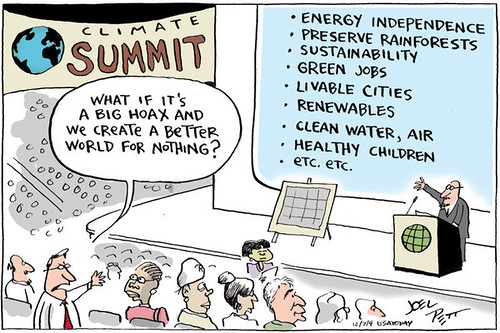Climate Change Denial
Climate denial is not merely a defense mechanism to deal
with climate change, but the intentful movement to sway opinion of those around
you to deny the existence and effect of climate change. In some ways, it is a therapeutic mechanism
to deal with uncertainties, with the dichotomy of living for today while being
cognizant of the future and the common good.
Also at play is the sense of helplessness, inability to action. It really creates a sense of dissonance that
is not easily resolve, one of Appoggiatura,
but that is not answered. Because of
this lack of resolution, maintaining the status quo and closing an eye is the
most palatable.
I see similarities in the emergence of active climate denial
to the war against child vaccinations and the threat of autism (at least up
until the controversy came to a head a few years ago). I have two sons aged 3 and 5 right now, and
certainly early on my wife and I were confronted with the idea that
vaccinations in children were linked to increased incidents of autism is
children. We certainly didn't want that
for our boys, and so were reconsidering having them vaccinated. And
yet on some level we need to place faith in facts, of the precautionary
principle, in science, and so we went through with the vaccinations.
Denial-supported individuals have the advantage that if they
see an external advantage to believing in anthropogenic climate change, they
will tend to move toward that camp. They
see it as yet another opportunity for advancement. If there is a buck to be made in mitigation
efforts, we’d all be all over it! And if
we can advance economically and scientifically, we become better as
people. [personal note] and we may even
be able to make the world a better place along the way
So – how does one combat climate change denial? I have been trying to answer this for a
number of years. It seems that the
easiest and most functional point of attack those in the denial camp have is in
the uncertainty of science. As an
example, a former climatologist with Environment Canada came and spoke with my
class. He let on that his new function was with a Heartland Institute funded
organization. He proceeded to state that
the world could use a little warming; it was cold in Alberta at that time. He focused on the uncertainty of the
statistics of the anthropogenic climate change camp. He zeroed in on the range of temperature
increased the IPCC was now predicting… 2 – 4 degrees this century. He was focused on this range; which was it; 2
degrees or 4 degrees? Why not 6 degrees? Why not 0 degrees? It is when you focus on
the uncertainties that you drive uncertainty into the minds of your
audience. With uncertainty, how can one
logically join the camp that purports great changes to come?
I did not invite him to return, but spoke to my class about
how it was an excellent opportunity to see the denial movement in full
action. “From the ashes a fire shall be
woken, a light from the shadows shall spring; renewed shall be blade that was
broken, the crownless again shall be king” – Tolkien
I have not come up with a definitive set of tools to combat
denial. It is really an experiential and
contextual thing, rising up and speaking to greater societal problems and the
emotions tied to them. It stems form
uncertainty, of hopelessness, and inability to have impact through agency. Once the greater population can see what the
truth is, I’d hope that action would be significantly more swift and effectual
than it has. Like other psychoanalytic
responses, there is no magic button to press to gain resolution.




0 Comments:
Post a Comment
<< Home